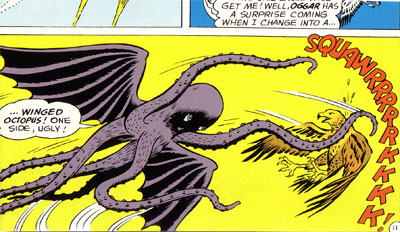Sometimes I try to deny my nature, but then Chris goes and posts about a conversation in which someone says something silly. And it turns out I used the silly bit as a major premise myself just last week. Oy.
From the category archives:
Look Like Flies
Josh Glenn has a great little slideshow for you, in the Boston Globe. His worthy theme: Winsor McCay’s classic early comic strip, “Dream of a Rarebit Fiend” [1904-1913]. (McCay is more famous for Little Nemo. You’ve certainly heard of that one.) The occasion: a lavish new edition, The Complete Dream of the Rarebit Fiend, all the strips reprinted for the first time at full size; edited and annotated by some fanatic by the name of Ullrich Merkl. Here’s the book page. You can download substantial samples (PDF). Looks nice, though pricey. (Older editions [amazon] are in print as well.)
As I was saying: Josh’s little slideshow – with voiceover – documents the influence of “Rarebit Fiend” on five later films: L’Age D’Or, King Kong, Dumbo, Mary Poppins, Tim Burton’s Charlie and the Chocolate Factory. I guess Glenn is taking his cue from Merkl’s work. I deem it well worth 3 minutes and 31 seconds of your time.
Speaking of the shift from print cartooning to film, Winsor McCay, if you don’t know, is pretty much the God-Grandfather of the animated cartoon. He was one of the very first (the very first?), and hand-drew every damn frame, apparently. (With an occasional assistant.) And he did these vaudeville tours in which he lectured and interacted with the films. Obviously the joke is to synchronize your patter with the film itself. YouTube has it all: “Little Nemo” (1911) (but you have to wait until, like, 8:30 minutes in for the actual animation to start.) “Gertie the Dinosaur” (1914); and “Gertie on Tour” (1921); “How a Mosquito Operates” (1912); and some other stuff, too. Gertie the Dinosaur has the distinction of being the first made-for-animation character, I believe.
Last but not least, Josh Glenn himself has a fun new book out: Taking Things Seriously [amazon] – I’ll get around to reviewing that one. Basically, he invited people to submit their objects. And so they did.
Kip Manley directs us to a very worthwhile discussion of the ‘intentional fallacy’ and ‘bad readers’, Helen Vendler and Plato’s “Euthyphro”. I’ll just dunk you in the middle: [click to continue…]
I present you with this week’s reason for thinking I read too many Legion of Super Heroes comics. I’m reading Crangle and Suppes, Language and Learning for Robots. (It’s part of the super popular ‘for robots’ series. My favorite being Wine Tasting For Robots.)
Anyway:
This book reports research that the authors have been doing together for the past decade on instructible robots …
In this book we explore the following two specific questions. What does it take for a robot to understand instructions expressed in a natural language such as English? What further challenges arise when the robot must learn from that instruction? The work we present falls naturally into three parts: theory, language performance, and learning. We briefly summarize each of these parts.
Part I on theory consists of four chapters. The first one sets forth our general ideas about instructible robots and how they are different from robots that operate autonomously. (xv)
Yes, but why do they have to be indestructible, I was asking myself?
I actually continued on like this for some time. You see, I had me a brief little thought about how it was probably going to turn out that they had some very abstract story about what a robot could learn, given an infinite amount of time. And somewhere along the line someone decided ‘indestructible robot’ was cute shorthand for this ideal limit; and I just never got the memo. Anyway. I think I need to get some sleep.
Liberal Fascism, the forthcoming opus by Jonah Goldberg, has undergone a subtitle change, as perhaps you have heard. Formerly it warned of “The Totalitarian Temptation From Mussolini to Hillary Clinton.” Said temptation will now run “…From Hegel to Whole Foods.”
The delays in publication must have been necessary given the burdens of fresh scholarship demanded by this broadening of scope.
The pub date at Amazon is December 26, which is not the part of the season when trade publishers bring out books they are going to push very hard. Somebody at Doubleday probably had the same thought recently expressed elsewhere:
I assume Frederick Kagan, Bradley Schlotzman, and Jonah’s mom are already getting complementary copies; Dinesh von Souza will probably do his patriotic duty; which leaves – ? A mule train a half-mile long will have to be rounded up to ship the remainder of the edition to the respectively vice-presidential and presidential libraries of Dan Quayle and George W Bush, where they will serve to fill out the echoing bookshelves and glut the hungry silverfish.
Hint to Goldberg: Make it a little more “campaign friendly.” That’s where dropping Hillary from the subtitle is probably going to hurt you some. How about “The Totalitarian Temptation from Dialectics to the Democratic Candidates”? Plus you’d get that extra alliteration — a real bonus, catchiness-wise.
Kieran asks where John Holbo is. Ahem. (Longer wikipedia entry here.)
I make a strict point of never blogging anything in the nature of a student-teacher or colleague-colleague interaction, but when a civilian knocks on my office door, comes in and says something funny, it’s fair game boyo.
So this kid comes in the door. (And he’s not a student at my institution but he’s home for the summer.) And he wants to ask me about Wittgenstein and philosophy of language and ‘reclaiming Kant’. And so I ask him a bit about what he means by that (sounds reasonable.) And, well, there is a bit of confusion. And it transpires that the reason nothing he is saying about the Sage of Königsberg is making much sense to me is that actually he’s talking about some project to do with Eve Ensler and The Vagina Monologues, etc. I ended up telling him I didn’t think Wittgenstein was quite what he was looking for. Still, these sorts of linguistic questions are quite interesting. Anyhoo. There was a moment there.
[edited to shield delicate sensibilities, ward off search engines, and to make the post funnier, actually]
Gentlemen, in the 1960’s, representations of octopi in comics often bordered on the faintly ridiculous.
Having lately received my handsome copy of The Octopi and the Ocean [click through for preview], I am happy to report that the contemporary situation is much improved.
“One day, two monogamously dedicated archaeological octopi recovered an ancient artifact from the timeless ocean floor. The artifact was the power of true marriages. When activated by an inseparable pair, the two would be endowed with a certain unstoppable positive energy.” In the event, a small boy is called upon to etc. etc.
Here’s an interview with the author: “It’s actually the fastest thing I’ve ever done, other than some stuff I did faster.”
If PZ Myers doesn’t have a copy, he really should order one.
I’m working up a longer post on this important subject. But, in the face of a certain natural skepticism, expressed in comments to my previous post, I have decided to seed discussion with a pair of frames from All Star Comics #24 (Spring, 1945):
If you happen to be at a scholarly institution with access to All Star Comics archives, vol. 6 [amazon], you can consult the original. Otherwise, you can wait for my update.
TONIGHT: Wildcat explains five fifteen centuries of German perfidy.
Last night Belle and I watched a classic war flick – 12 O’Clock High [wikipedia], with Gregory Peck as the stoical General Savage. It contains extensive and rather impressive real combat footage: formations of flying fortresses vs. German fighters with lots of planes going down in smoke and flames and frantic little stick figures trying to bail out safely, with apparently mixed results. Then dropping of bombs and large explosions. It suddenly struck me that it’s sort of weird to use real war footage in Hollywood entertainments.
Our Scott has unleashed impressive versificational forces (here and here). In comments, Adam Roberts suggests we try to get The Crooked Timber Littel Booke of Political, Philosophical and Scientifik Limerics out by X-Mas. I am duty-bound to report that I have already written A Philosophical Abecedarium, if somehow you managed to miss it back in 2002. I invite new contributions. (I’ve got two ‘k’s, so I might as well have dupes for the others.)
And let me take this opportunity to continue my occasional series of comics recommendations. In this thread, everyone piped up with faves, but no one mentioned Powers, by Bendis and Oeming. It’s more or less a cop procedural, with the protagonists as ordinary human officers responsible for investigating ‘Powers’-related crimes. You can imagine how that might get amusing. The hard-boiled dialogue is just great. And, in fact, you can read the entire first story arc – Who Killed Retro Girl? – here. (The navigation is a bit confusing. Most of the apparent links are just for jokey decoration. Click on the little ‘click here’ button in the Retro Girl box at the top. That takes you here. Then click the small, ochre ‘full daily page archive’ button on the left. Then pull down the little pull-down thingy to start at the beginning, rather than with today’s offering – which is p. 110. Whew! Now you just keep clicking ‘next’ through all 110 pages. You probably would have figured that out yourself.) Some of the pages are more full-featured, with links to pages of the original script, sketches and such. For fanboys.
The first year of the series – a whopping 450 pages worth – is available very cheaply: Powers, vol. 1 [amazon]. Good deal.
Glenn Fleishman tags me with one of these silly little things. Alright, then. Five things most people don’t know about me.
Did you know?
On April 2, 1917, the United States declared war on Germany despite considerable public opposition. Just a few months after the United States entered the war, Secretary of the Treasury, William Gibbs McAdoo, called the public mood a “delirium”. Sauerkraut became liberty cabbage, German Shepards became Alsatians and the city of Syracuse banned pinochle, a German card game. The press published calls for mass hangings of “disloyal German-Americans” and some clergymen compared Germans to cholera germs that must be annihilated. Despite this, naturalized Germans collected relief funds for the Red Cross and served in the U.S. Army.
They banned pinochle? (Wikipedia informs me it is etymologically derived from the German Binokel.) ‘Liberty cabbage’ puts that whole ‘freedom fries’ episode in perspective. At least we aren’t getting any dumber. I wonder whether some shrewd entrepreneur marketed pinochle decks under the badass tempting slogan ‘banned in Syracuse!’
Will Wilkinson “claims”:http://www.cis.org.au/policy/spring_06/polspring06_wilkinson.htm that we can avoid positional conflicts in a world of infinitely proliferating status dimensions. [click to continue…]
Via “Public Knowledge”:http://www.publicknowledge.org/node/643, this “press release”:http://commerce.senate.gov/public/index.cfm?FuseAction=PressReleases.Detail&PressRelease_id=248662&Month=9&Year=2006 from the Senate Commerce Committee touting a survey which reveals that an overwhelming majority of the American public oppose net neutrality. Or perhaps not. The exact question asked was:
Which of the following two items do you think is the most important to you:
Delivering the benefits of new TV and video choice so consumers will see increased competition and lower prices for cable TV
OR
Enhancing Internet neutrality by barring high speed internet providers from offering specialized services like faster speed and increased security for a fee
Given how egregiously the question was loaded, the surprise is that one third of the respondents went for the second option. It’s probably superfluous to mention that the survey was funded by Verizon, and carried out by a ‘bipartisan’ group of bought-and-paid-for hacks from Public Opinion Strategies and Joe Lockhart’s Glover Park Group.



